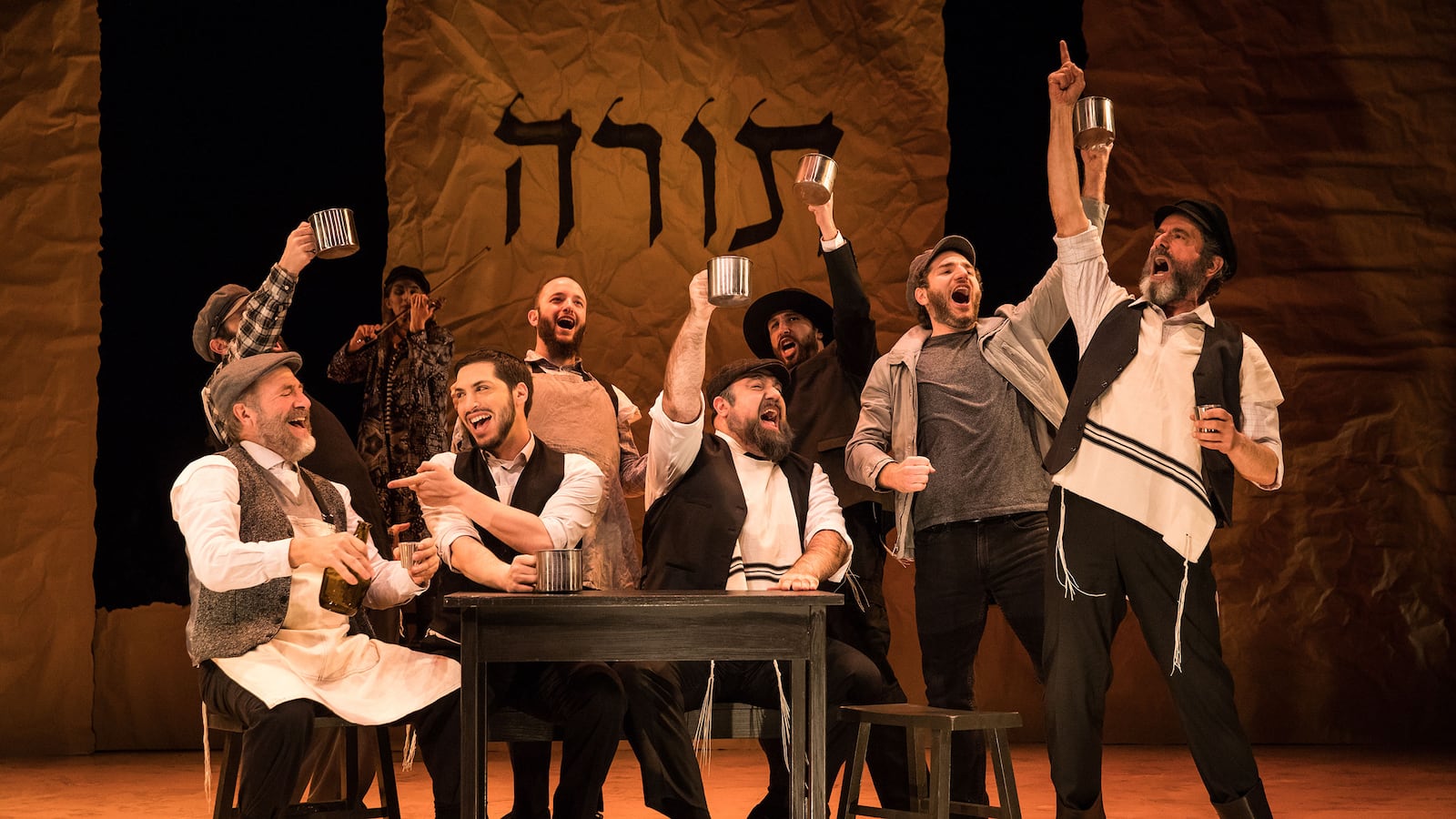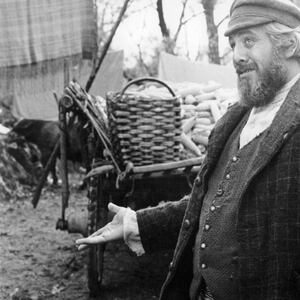When I first saw Fiddler on the Roof in Yiddish at the National Yiddish Theatre Folksbiene, I called it a piece of history unfolding, and a piercing delight. Now playing at Stage 42 on Theatre Row off-Broadway, it feels bigger, its humor more broadly played. But it still pierces, and sharply.
This version of the musical is a return to a complex set of roots. Before the 1971 Oscar-winning film starring Chaim Topol came the original 1964 Fiddler musical. Sheldon Harnick’s lyrics, Joseph Stein’s book, and Jerry Bock’s music were in English, yet based on Sholem Aleichem’s stories (in Yiddish) Tevye and His Daughters, written between 1894 and 1914.
Fidler Afn Dakh, as the musical is known in Yiddish, was first performed as such in Israel in 1965—Harnick and Stein’s words translated by Shraga Friedman, who, the program notes of this production tell us, was a native of Warsaw who immigrated to what was then known as the Land of Israel at the outbreak of World War II. The Yiddish version of the musical has never been performed in America, until now.
Friedman kept true to the spirit of the source material, but sometimes to keep pace with the music and meter altered the precise translations of words. The songs you see are tunefully familiar, even if the words are new—“If I Were a Rich Man” becomes “Ven Ikh Bin a Rotshild,” “Matchmaker, Matchmaker” becomes “Shadkhnte, Shadkhnte.”
In his direction of the Folksbiene production, the Oscar- and Tony Award-winning actor and director Joel Grey sensitively gleans the right amount of comedy and drama, and knockabout humor and gnarlier pathos, from the text without overindulging any extreme.
This is the story of a family and small community going through the formative and personal challenges of life, while an even bigger change is about to hit them—the order that they leave their home, uproot themselves, or die.
There is the familial upheaval facing Tevye the milkman (a marvelous, luxuriantly bearded Steven Skybell) and his wife, Golde (Jennifer Babiak, replacing Mary Illes), who have five daughters, three of whom during the musical make romantic decisions that challenge convention.
As the New York Post reported, neither Grey nor all but three of the show's 26-member cast knew much Yiddish when they undertook the project. The scripts are in English, the dialogue and song lyrics spelled out phonetically.
It is 1905, and the family lives in the Russian shtetl of Anatevke, where the divine Jackie Hoffman as matchmaker Yente runs a service vastly more efficient and ruthless than any swiping left and swiping right.

Raquel Nobile, Rosie Jo Neddy, Rachel Zatcoff, Stephanie Lynne Mason, and Samantha Hahn.
Victor Nechay/ProperPixThis is also, then, a story that asks what place tradition (“traditskye,” as the first number and its refrains have it) has in a changing world, how it can be held on to, why should it be held on to, and how and why it necessarily must evolve. The songs may seem quaint and nostalgic, but what underpins them is anything but. The language and era of Fiddler now in unison provide it with an insistent power.
On the sides of the stage, there are two sets of supertitles to follow along in English, while on it a brilliant company of actors and dancers is delivering a beautiful and—especially as it progresses—hard-edged musical.
The comedy in the show sees Tevye, who has the bearing of an irascible patriarch but the soft and mushy heart of a cuddly teddy bear (or so it seems), get to grips with those romantic choices. First there is Tsaytl (Rachel Zatcoff), whom Tevye wants to marry off to older butcher Leyzer-Volf (Bruce Sabath).
However, Tsaytl wants the lovely but timid tailor Motl Kamzoyl (Ben Liebert)—just wait to see his joy at receiving his first sewing machine; it almost matches his love for her.
Another daughter, Hodl (Stephanie Lynne Mason), falls for political radical (although by today’s standards, a common-sense thinking moderate), Pertshik (Michael Einav), who scandalizes the community by encouraging mixed-sex dancing at a wedding. Tevye, with regular entreaties to God and rolling of eyes, puts up with it, makes sense of it.
His sparring partner and support is Lauren Jeanne Thomas, the fiddler, who exists above and alongside the action. Thomas and her instrument are a vital character: their own Greek chorus of wit, questioning, mournfulness, and celebration.
The stage isn’t over-decorated by Beowulf Borrit; the most significant piece of decoration is a drape with the word “Torah” written on it in Hebrew, torn at a particularly charged moment to gasps from the audience.
The show feels like an honoring reclamation of a version of Fiddler, and its real-life historical context in the Russian Pale of Settlement, rather than anything dramatically opportunistic or theatrically kitschy.
It brings to us, a modern audience (Jewish and not), a sense of history and also a making sense of history—and with its theme of forced migration and cultural persecution, it feels timely. Those themes are not hammered didactically, as they might be; they simply play out in front of us.
The presence of the audience becomes an important part of this show. With many older people there when I attended at the Folksbiene, there was a soundtrack accompanying much being said and sung from the stage. The ladies behind me hummed to the music of Zalmen Mlotek’s orchestra, the musicians partly concealed behind a curtain and providing a precise, ordered symphony of brilliance from start to end.
There was affectionate recognition of characters (the protective father, the mother trying to keep it together, their ruminations on love, duty, and family), and—most present of all—there were sometimes loud exclamations back at the actors of some of the Yiddish words and phrases that clearly struck a chord with those watching from their own families and pasts.
There may be less of this, less concentrated, at Stage 42, with its broader audience but it is still there, tangible. Look around you at the rapt faces flickering with recognition, joy, and sadness.
Grey and Staś Kmieć, who oversees musical staging and choreography, execute the most exuberant and fabulous dance sequences this critic has seen in New York in some time, including the most lauded Broadway shows.
As the romantic knots of the first act play out, the dance ensemble parlays a wonderful physical riot, which reaches a delirious apotheosis with the appearance of the ghostly Bobe Tsaytl (Lisa Fishman), Golde's dead grandmother, delivering her own romantic words of advice.
The grit in Fiddler is the threat of familial and social fracture, which eventually blooms into reality. First Hodl must leave to find an imprisoned and exiled Pertshik, and then Tevye turns out not to be so cuddly and amenable after all when another daughter, Khave (Rosie Jo Neddy), falls for the Russian Fyedke (Cameron Johnson).
From this, there seems at first no way back: Daughter is dead to father. Then the town’s Russian superintendent warns Tevye and the townspeople that a micro-pogrom centered on the shtetl, ordered by the tsar, is about to occur. The Jewish townsfolk have three days to leave.
My grandfather’s family (as he wrote in his book Footprints in the Sand) was also forced to flee this part of Russia, arriving to build lives in the Leylands Jewish community of Leeds in the north of England. Others, as in the musical, went to America and what is now Israel. Perhaps what one hears in the audience are the specifics of very personal memories reactivated by Fiddler.
The musical is not without internal faults. Most noticeably, its female characters exist in service to men, and when not directly, then in service to matters and duties of the heart. That may be historically accurate, but poor Golde has little to do but look frustrated and matriarchally intimidating as Tevye’s wife.
Their shared song, however, is a beauty. “Libst Mikh, Sertse (Do You Love Me?)” interrogates the meaning and action of love in a long-term relationship. It is tender but not steeped in sugar, a clear-eyed ode of romantic realism.
That echoed this critic’s feeling leaving the Yiddish Fiddler: touched, but not mawkishly; nostalgic, but not syrupy; yet reminded and cautioned emphatically of the specter of intolerance and cruelty, and of the bravery and fortitude of all those—including the fictional Tevye, his family, and neighbors—who have to uproot themselves to first survive and then, one hopes, find better lives.
Fiddler on the Roof in Yiddish is at Stage 42, Theatre Row, NYC, until June 30. This is an amended version of Tim Teeman‘s original review.







